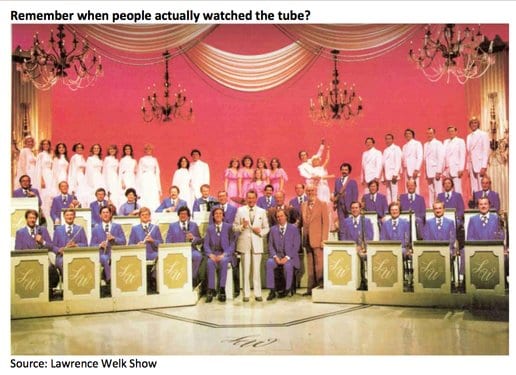Netflix, who has been gaining market share at the expense of traditional TV, cable and satellite service providers owes its success to offering a bundled set of services to a new generation of customers who are abandoning traditional “free” TV and expensive, inflexible cable companies in droves. Satellite, while suitable for remote locations, does not offer fast enough or sufficient bandwidth to be of interest to today‘s on-demand crowd.
The so-called Millennia generation find traditional “free” TV a non-starter – watch the shows you like at a pre-determined time? You‘ve got to be kidding. And put up with annoying ads? Forget it. These viewers want to be able to downstream shows they want to watch when they have the time, and increasingly on mobile devices.
Sitting in front of the tube to watch TV is as passé as Johnny Carson, Lawrence Welk or Ed Sullivan – younger readers probably do not remember any of them. No worries, you did not miss much.

Traditional cable and satellite TV is losing customers over time. It is expensive and the multiples of channels may be well-suited to the retired couple who have little else to do, but not the time-starved Millennials who want to watch a particular show, sport event, live concert or the latest movies on a whim.
And when they do, they want it now and there, where ever they happen to be.
An article in Financial Times (13 Feb 2016), describes the plight of the incumbents facing dramatic shift in viewing habits made possible courtesy of new technologies and options that did not exist until recently. There may be useful lessons for the utility business.
“… broad changes in viewing habits thanks to new forms of content available on a wide range of devices. From YouTube and Facebook, to messaging apps such as Snapchat and WhatsApp, to Netflix and Amazon, viewers have more options and more control over what they watch.”
The same article points out that, “Cable bundles may be particularly vulnerable to these changes as a new generation of viewers balks at expensive monthly bills for packages of channels.”
The most pungent and relevant is the following passage in the article:
A new category of customer has emerged for media companies to grapple with: so-called
– Cord-nevers‘, who have never paid for TV;
– Cord-cutters‘, who are cancelling their pay-TV subscriptions; and
– Cord-shavers,’ who are choosing cheaper bundles of fewer channels from cable providers.”
The cord-nevers would apply to customers not already connected to the network, say, in remote areas, far from the grid, or in developing countries. The parallels to cord-cutters are customers who may abandon the grid altogether relying on self-generation and storage, currently appealing to a niche segment. The number of cord-shavers, however is likely to rise rapidly as more buildings are designed as zero net energy (ZNE) with distributed generation and, increasingly, storage.

The equivalent terms in utility parlance would be to refer to such customers as operating in grid-assisted, grid-parallel or off-grid, in reverse order.
An earlier article titled TV flickers as viewers find new screens, also in Financial Times (14 Aug 2015), indicates that young, media-savvy viewers are the first to abandon traditional TV. It says that thus- far, “… cord-cutting might be fashionable for trendy elites, but it has yet to make a dent in ̳real‘ America‘s love affair with television.”
“With roughly 100 million US pay-TV subscribers, the loss of half a million customers does not equal Armageddon. The subscriber base shrunk 0.7% year-on-year in the second quarter (2015), its sharpest contraction on record, but nowhere near as precipitous as the declines seen in other media businesses such as newspapers and recorded music.”
“But after a decade of fretting about cord-cutting, investors think it has finally arrived.”
 The same, perhaps, can be said about the utility business.
The same, perhaps, can be said about the utility business.
Thus far, the industry‘s revenue erosion due to distributed energy resources (DERS), which includes energy efficiency and distributed generation, are negligible and limited to a few states with ambitious energy efficiency policies, generous net energy metering laws and high retail tariffs, say California or Hawaii.
But given the amount of effort that incumbent utilities have, and are, putting into protecting their traditional turf and – in the words of Warren Buffet – sloppy business model, one can surmise that they expect more to come.
On this point, this editor would venture to say that what we have seen to date is the mere tip of the iceberg. Just as the traditional TV, satellite and cable TV business are losing market share to newcomers, incumbent utilities can expect increased competition on the grid‘s edge, where the high margin may be hiding.
Perry Sioshansi is president of Menlo Energy Economics, a consultancy based in San Francisco, CA and editor/publisher of EEnergy Informer, a monthly newsletter with international circulation. He can be reached at [email protected]






